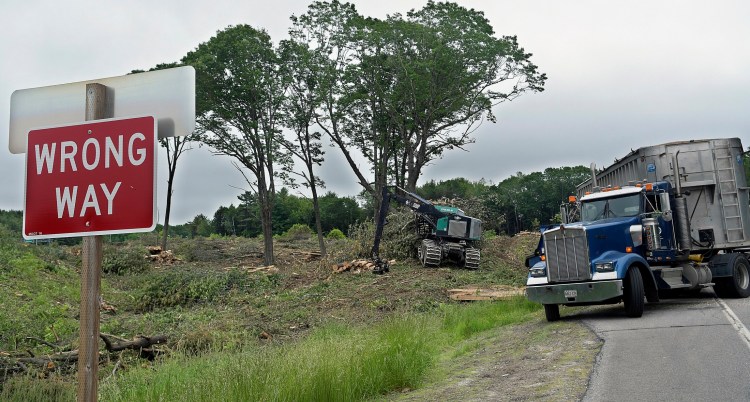In recent weeks, motorists have noticed trees coming down at a rapid clip around exits from Interstate 95 near Augusta.

Workers attend to a feller buncher Thursday on the southbound on-ramp to Interstate 95 off Western Avenue in Augusta. the Maine DOT recently cleared all the trees between the exit and on ramps at Exit 109. Kennebec Journal photo by Andy Molloy
Turns out the tree removal is part of the Maine Department of Transportation’s vegetation management plan — in the middle of a multi-year timetable — aimed at improving safety along the highway. According to the DOT, the work includes mowing, hand removal and herbicide use to control roadside vegetation.
There are multiple ways the removal of trees and plants along the highway improves safety, according to Paul Merrill, Maine DOT’s public information officer. It reduces the amount of wildlife near the roads, he said, allows drivers to see wildlife when it is there, increases drivers’ visibility, allows sunlight to better melt snow and ice in the winter, and eliminates the possibility of trees and tree branches falling onto the road.
Ernie Gasbarino, a Massachusetts resident who frequently travels in Maine, said he is fine with the change as long as the area is kept natural.
“If they are keeping it a natural environment, I think it’s a good thing,” he said.
You can’t react as quickly on interstates, Gasbarino said, so removing trees is a good way to help avoid fallen branches.
Carol Falcone, a self-described conservationist who is originally from Rhode Island, said she likes the clearing because it’s for safety reasons. She said Rhode Island is moving slower when compared to Maine.
“I think it’s great as long as it protects drivers,” Falcone said.
As long as they replace it with flowers or smaller plants, she said, “it’s fine with me.”

Workers cut trees and load them onto a logging truck Wednesday at the exit 112 ramp to Interstate 95 off Civic Center Drive in Augusta. Kennebec Journal photo by Scott Monroe
The DOT is paying Comprehensive Land Technologies $416,790 to clear areas along I-95 in Clinton, Benton, Fairfield, Waterville, Sidney and Augusta.
“We are working to make these improvements to the system as a whole, working in the region from north to south as funds are available,” Merrill said, noting that similar work has already been undertaken in the Waterville area.
Officials from the National Resources Council of Maine and Environment Maine, both organizations that advocate for wildlife, said they hadn’t been working on this issue.
What is being cut down will be replaced with native species like flowers over the next few summers, Merrill said.
Bob Moosmann, the DOT’s statewide vegetation manager, said the department is setting aside “significant tracts of land” for Monarch butterfly habitats.
“This will include establishing milkweed, since Monarch butterflies use it to lay eggs, and the caterpillars feed on it to survive and complete the life cycle,” Moosmann said in an email.
In the clearing contracts, the wood belongs to the contractor, which helps reduce the cost of the work, Moosmann said in an email.
“They will be used to make paper or bark mulch,” Jason Tyler, an employee of the contractor Comprehensive Land Technologies, said. “They’ll go to a traditional state of Maine market.”
Send questions/comments to the editors.



Success. Please wait for the page to reload. If the page does not reload within 5 seconds, please refresh the page.
Enter your email and password to access comments.
Hi, to comment on stories you must . This profile is in addition to your subscription and website login.
Already have a commenting profile? .
Invalid username/password.
Please check your email to confirm and complete your registration.
Only subscribers are eligible to post comments. Please subscribe or login first for digital access. Here’s why.
Use the form below to reset your password. When you've submitted your account email, we will send an email with a reset code.